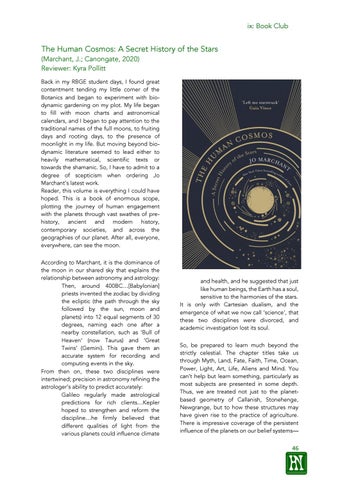ix: Book Club
The Human Cosmos: A Secret History of the Stars (Marchant, J.; Canongate, 2020) Reviewer: Kyra Pollitt Back in my RBGE student days, I found great contentment tending my little corner of the Botanics and began to experiment with biodynamic gardening on my plot. My life began to fill with moon charts and astronomical calendars, and I began to pay attention to the traditional names of the full moons, to fruiting days and rooting days, to the presence of moonlight in my life. But moving beyond biodynamic literature seemed to lead either to heavily mathematical, scientific texts or towards the shamanic. So, I have to admit to a degree of scepticism when ordering Jo Marchant’s latest work. Reader, this volume is everything I could have hoped. This is a book of enormous scope, plotting the journey of human engagement with the planets through vast swathes of prehistory, ancient and modern history, contemporary societies, and across the geographies of our planet. After all, everyone, everywhere, can see the moon. According to Marchant, it is the dominance of the moon in our shared sky that explains the relationship between astronomy and astrology: Then, around 400BC…[Babylonian] priests invented the zodiac by dividing the ecliptic (the path through the sky followed by the sun, moon and planets) into 12 equal segments of 30 degrees, naming each one after a nearby constellation, such as ‘Bull of Heaven’ (now Taurus) and ‘Great Twins’ (Gemini). This gave them an accurate system for recording and computing events in the sky. From then on, these two disciplines were intertwined; precision in astronomy refining the astrologer’s ability to predict accurately: Galileo regularly made astrological predictions for rich clients…Kepler hoped to strengthen and reform the discipline…he firmly believed that different qualities of light from the various planets could influence climate
and health, and he suggested that just like human beings, the Earth has a soul, sensitive to the harmonies of the stars. It is only with Cartesian dualism, and the emergence of what we now call ‘science’, that these two disciplines were divorced, and academic investigation lost its soul. So, be prepared to learn much beyond the strictly celestial. The chapter titles take us through Myth, Land, Fate, Faith, Time, Ocean, Power, Light, Art, Life, Aliens and Mind. You can’t help but learn something, particularly as most subjects are presented in some depth. Thus, we are treated not just to the planetbased geometry of Callanish, Stonehenge, Newgrange, but to how these structures may have given rise to the practice of agriculture. There is impressive coverage of the persistent influence of the planets on our belief systems—
46
